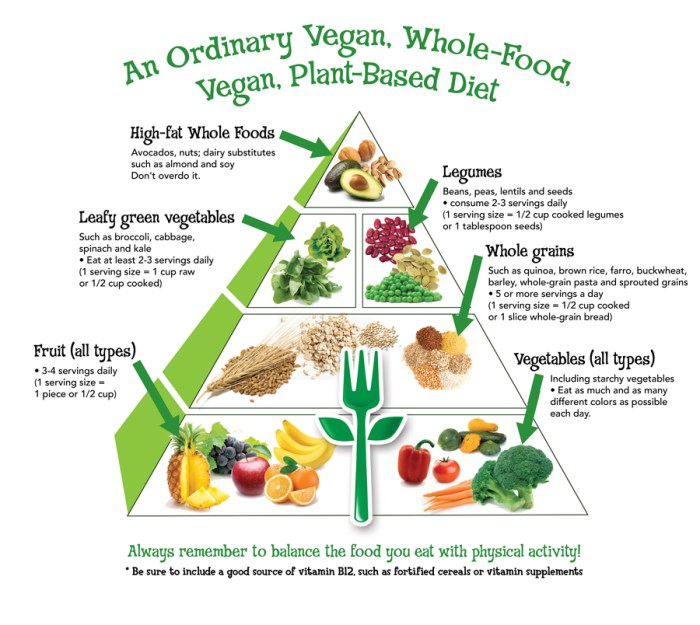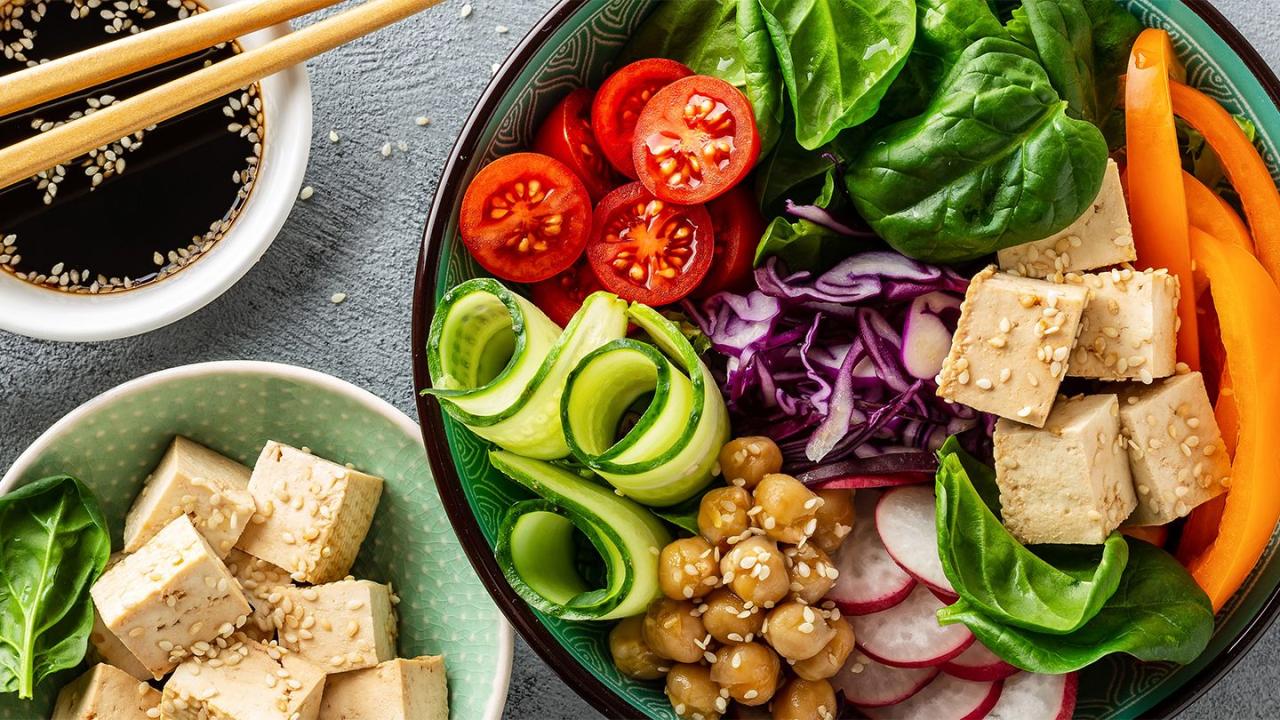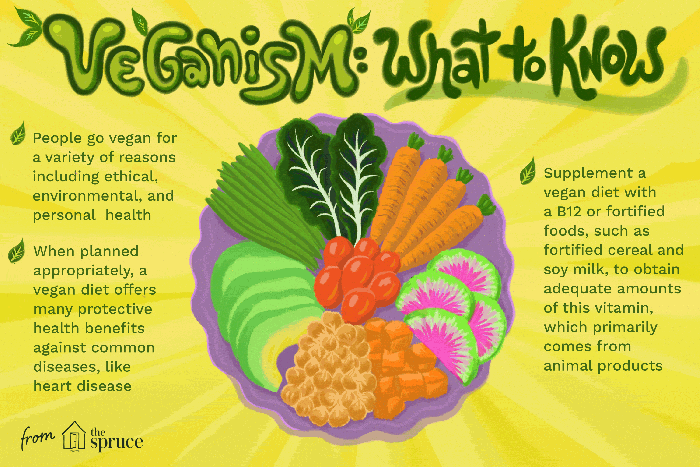Vegan diet definition encompasses a lifestyle that abstains from consuming any animal products, including meat, dairy, eggs, and honey. This dietary choice is rooted in ethical concerns for animal welfare and environmental sustainability, as well as the pursuit of optimal health.
Embarking on a vegan journey entails embracing a wide array of plant-based foods such as fruits, vegetables, legumes, nuts, seeds, and whole grains. By excluding animal products, vegans prioritize a compassionate and eco-conscious approach to nutrition.
Definition of a Vegan Diet

Veganism is a plant-based diet that excludes all animal products, including meat, dairy, eggs, and honey. Vegans believe that it is unethical to consume animal products because animals are sentient beings who deserve to live free from exploitation and harm.
A vegan diet is rich in fruits, vegetables, whole grains, legumes, and nuts. These foods are all packed with nutrients, including vitamins, minerals, fiber, and antioxidants. A vegan diet can be healthy and satisfying, and it has been linked with a number of health benefits, including a reduced risk of heart disease, stroke, type 2 diabetes, and some types of cancer.
Foods Included in a Vegan Diet
- Fruits: All fruits, including apples, bananas, oranges, berries, and melons.
- Vegetables: All vegetables, including leafy greens, broccoli, cauliflower, carrots, and potatoes.
- Whole grains: All whole grains, including brown rice, quinoa, oats, and whole-wheat bread.
- Legumes: All legumes, including beans, lentils, peas, and chickpeas.
- Nuts and seeds: All nuts and seeds, including almonds, walnuts, cashews, and chia seeds.
- Plant-based milk: All plant-based milk, including almond milk, soy milk, and oat milk.
- Plant-based yogurt: All plant-based yogurt, including soy yogurt, almond yogurt, and coconut yogurt.
- Plant-based cheese: All plant-based cheese, including soy cheese, almond cheese, and cashew cheese.
Foods Excluded from a Vegan Diet
- Meat: All meat, including beef, pork, chicken, and fish.
- Dairy: All dairy products, including milk, cheese, yogurt, and ice cream.
- Eggs: All eggs, including chicken eggs, duck eggs, and quail eggs.
- Honey: Honey is produced by bees, so it is not considered vegan.
- Other animal products: Any other products that come from animals, such as gelatin, whey protein, and lanolin.
Health Benefits of a Vegan Diet
A vegan diet, characterized by the exclusion of all animal products, has gained significant recognition for its potential health benefits. Research suggests that adopting a vegan lifestyle may positively impact various aspects of physical well-being.
The debate of whether vegetarians can indulge in seafood has sparked discussions for ages. While some argue that the definition of vegetarianism excludes the consumption of all animal products, including those from the sea, others believe that the term encompasses a broader spectrum.
To delve deeper into this intriguing topic, let’s explore the article Can Vegetarians Eat Seafood , which sheds light on the nuances of vegetarianism and its relationship with seafood consumption.
One notable advantage of a vegan diet is its potential to promote heart health. Studies have demonstrated that plant-based diets are rich in fiber, antioxidants, and polyunsaturated fatty acids, all of which have been associated with a reduced risk of cardiovascular disease.
Vegan diets are typically low in saturated fat and cholesterol, further contributing to their heart-protective effects.
Weight Management
Vegan diets are often associated with weight management. The high fiber content of plant-based foods promotes satiety, leading to a feeling of fullness after meals. This can help individuals consume fewer calories overall, potentially contributing to weight loss or maintenance.
Additionally, vegan diets are generally lower in calories and fat compared to omnivorous diets.
Chronic Disease Risk
Emerging research indicates that vegan diets may play a role in reducing the risk of certain chronic diseases. For instance, studies have suggested that a vegan diet may be associated with a lower risk of type 2 diabetes, as it promotes stable blood sugar levels and reduces insulin resistance.
Furthermore, vegan diets have been linked to a decreased risk of certain types of cancer, such as prostate and colorectal cancer, due to their high intake of antioxidants and phytochemicals.
Seafood is a popular source of protein, but can vegetarians eat it? The answer depends on the individual’s definition of vegetarianism. Some vegetarians choose to abstain from all animal products, including seafood, while others may choose to eat fish or shellfish.
For those who want to include seafood in their diet, can vegetarians eat seafood provides a comprehensive guide to the different types of seafood and their nutritional value.
Ethical Considerations of a Vegan Diet
Veganism is not just a dietary choice; it’s a lifestyle driven by deep-rooted ethical considerations. Vegans believe that all animals deserve to live free from harm and exploitation, and they extend this compassion to the environment as well.
One of the primary ethical motivations behind veganism is the belief that animals are sentient beings capable of experiencing pain, suffering, and joy. Vegans argue that it is morally wrong to inflict unnecessary harm on animals for the sake of human consumption.
Animal Welfare
The meat, dairy, and egg industries subject animals to horrific conditions, including factory farming, cramped cages, and painful mutilations. Vegans believe that these practices are cruel and unnecessary, and they choose to avoid products that support such industries.
Environmental Concerns
In addition to animal welfare, vegans are also concerned about the environmental impact of animal agriculture. Raising animals for food requires vast amounts of land, water, and energy, and it contributes significantly to greenhouse gas emissions, deforestation, and water pollution.
By choosing a vegan lifestyle, individuals can help to reduce their impact on the planet and support a more sustainable future.
Challenges and Considerations of a Vegan Diet

Embracing a vegan lifestyle presents several potential challenges and considerations that require thoughtful attention. These include ensuring adequate nutrient intake, planning meals effectively, and navigating social situations.
Nutrient Supplementation
A vegan diet may not naturally provide sufficient amounts of certain essential nutrients, such as vitamin B12, vitamin D, iron, calcium, and omega-3 fatty acids. Therefore, supplementation is often necessary to prevent deficiencies and maintain optimal health.
Meal Planning
Adopting a vegan diet requires careful meal planning to ensure a balanced intake of all essential nutrients. This involves incorporating a variety of plant-based foods, such as fruits, vegetables, legumes, nuts, seeds, and whole grains, into daily meals.
Social Support
Transitioning to a vegan diet can sometimes pose social challenges, especially in environments where non-vegan options are prevalent. Having a support system, such as friends, family, or a community of like-minded individuals, can provide encouragement and guidance.
Variations and Subtypes of Vegan Diets

The vegan diet encompasses various approaches, each with unique characteristics and benefits. Here are some common variations:
Raw Veganism
Raw veganism involves consuming uncooked or minimally cooked plant-based foods. Advocates believe that heating food above 40-48°C (104-118°F) destroys enzymes and nutrients.
- Benefits:May preserve nutrients, reduce inflammation, and promote digestive health.
Whole-Food Veganism
Whole-food vegans prioritize unprocessed, plant-based foods such as fruits, vegetables, legumes, and whole grains. They avoid processed foods, refined sugars, and oils.
- Benefits:Rich in fiber, vitamins, minerals, and antioxidants; may reduce the risk of chronic diseases.
Flexitarianism, Vegan diet definition
Flexitarianism is a semi-vegetarian diet that primarily consists of plant-based foods but occasionally includes animal products such as meat, fish, or eggs.
- Benefits:Allows for flexibility while still reducing meat consumption; may improve health outcomes.
Practical Tips for Adopting a Vegan Diet
Embarking on a vegan journey can be an enriching experience, but it’s essential to approach it with a well-informed and practical mindset. Here’s a comprehensive guide to help you navigate the transition to a plant-based lifestyle.
Meal Planning
Planning your meals in advance is crucial for a successful vegan diet. This helps ensure you’re consuming a balanced and nutritious intake. Consider the following tips:
- Focus on whole, unprocessed foods:Fruits, vegetables, whole grains, legumes, and nuts should form the foundation of your meals.
- Include a variety of plant-based proteins:Beans, lentils, tofu, tempeh, seitan, and quinoa are excellent sources of protein.
- Get enough calcium:Fortified plant milks, leafy greens, and fortified cereals can provide adequate calcium intake.
- Consider vitamin B12:This vitamin is not naturally found in plant foods, so supplementation or fortified foods are necessary.
Grocery Shopping
Navigating the grocery store as a vegan can be made easier with these tips:
- Read food labels carefully:Check ingredient lists for hidden animal-derived ingredients like gelatin, whey, and casein.
- Explore the produce section:Stock up on fresh fruits and vegetables for a wide range of nutrients and antioxidants.
- Check the frozen section:Frozen fruits, vegetables, and plant-based meat alternatives are convenient and nutritious options.
- Visit specialty vegan stores:These stores offer a wide selection of vegan products, making it easier to find what you need.
Dining Out
Eating out as a vegan doesn’t have to be challenging. Here are some tips:
- Research restaurants in advance:Look for vegan-friendly restaurants or check online reviews to see if they offer vegan options.
- Call ahead:If you’re unsure about the menu, call the restaurant and inquire about vegan dishes or if they can accommodate your dietary needs.
- Ask about ingredients:Don’t hesitate to ask the server about any ingredients you’re unsure about to avoid any potential allergens or animal-derived products.
- Bring your own snacks:If you’re concerned about finding suitable vegan options, consider bringing your own snacks or meals.
Resources and Support for Vegans
Vegans have access to a wealth of resources and support systems to aid their journey. Online communities provide a platform for vegans to connect, share experiences, and seek advice from like-minded individuals. Cookbooks and recipe websites offer a wide range of vegan culinary creations, catering to diverse tastes and dietary preferences.
Registered dietitians specializing in vegan nutrition can provide personalized guidance and ensure that vegans meet their nutritional needs.
Professional Guidance
Seeking professional guidance from registered dietitians is crucial for vegans, especially those new to the lifestyle. Dietitians can assess individual nutritional requirements, develop personalized meal plans, and provide guidance on meeting specific nutrient needs. They can also assist with transitioning to a vegan diet, ensuring a smooth and healthy process.
Last Recap: Vegan Diet Definition
In conclusion, the vegan diet definition extends beyond mere dietary restrictions; it embodies a philosophy that values compassion for animals, environmental stewardship, and personal well-being. Whether driven by ethical concerns, health aspirations, or a combination of both, adopting a vegan lifestyle can empower individuals to make a positive impact on their own health, the planet, and the lives of sentient beings.
FAQ
What are the key principles of a vegan diet?
A vegan diet excludes all animal products, including meat, poultry, fish, dairy, eggs, and honey, emphasizing plant-based foods like fruits, vegetables, legumes, nuts, seeds, and whole grains.
What are the potential health benefits of a vegan diet?
Studies suggest that a vegan diet may promote heart health, aid in weight management, and reduce the risk of certain chronic diseases such as type 2 diabetes and some types of cancer.
What ethical considerations drive people to adopt a vegan lifestyle?
Vegans often choose this diet due to concerns about animal welfare, the environmental impact of animal agriculture, and the belief that it is unethical to consume animals.
What are some challenges associated with a vegan diet?
Potential challenges include ensuring adequate intake of certain nutrients like vitamin B12, calcium, and iron, as well as navigating social situations and dining out options that may not always cater to vegan preferences.
How can I transition to a vegan diet?
Start gradually by incorporating more plant-based foods into your meals, seek guidance from a registered dietitian or healthcare professional, and explore online resources and support groups for vegans.